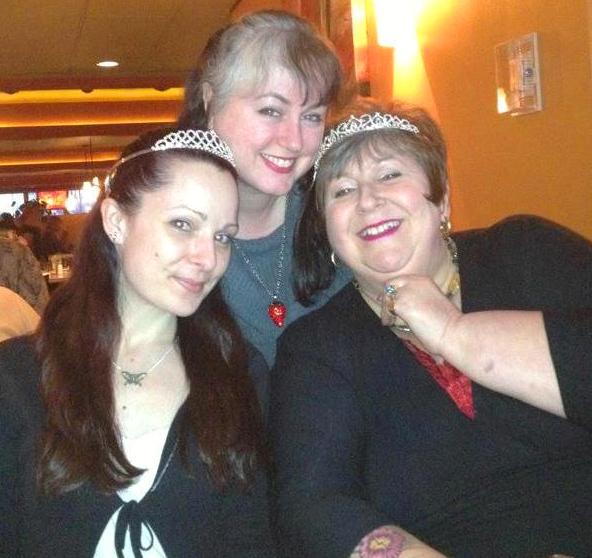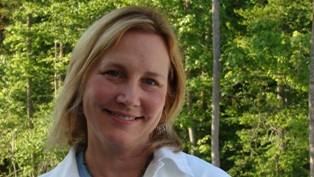 Yesterday in Seattle, about 35 miles north of where "the real Ivan" spent 27 years at a Tacoma, Wash., strip mall, Katherine Applegate won the 2013 Newbery Medal for The One and Only Ivan (HarperCollins). Our review called Ivan "an animal hero that will take his place with other courageous and beloved animals such as Babe, Mrs. Frisby, Charlotte and Wilbur."
Yesterday in Seattle, about 35 miles north of where "the real Ivan" spent 27 years at a Tacoma, Wash., strip mall, Katherine Applegate won the 2013 Newbery Medal for The One and Only Ivan (HarperCollins). Our review called Ivan "an animal hero that will take his place with other courageous and beloved animals such as Babe, Mrs. Frisby, Charlotte and Wilbur."
Congratulations! How do you feel?
I've been in a state of stunned disbelief. My first thought after I won was, "Oh my God, I have to give interviews," and the second thought was, "Oh my God, I have to give a speech." It's really gratifying because it was a story near and dear to my heart--because it's true and heartbreaking. It's resonated with kids. The best part of winning the Newbery is the idea that more kids will know Ivan's story.
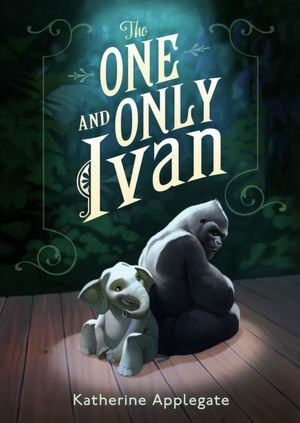 Did growing up in Michigan engender your love of animals?
Did growing up in Michigan engender your love of animals?
I was born in Ann Arbor and grew up in Grand Rapids. I love Michigan. I don't love the cold. I grew up with lots of animals, and I wanted to be a vet growing up. I worked for a vet in high school. I've always wanted to try an animal fantasy. If I knew how many people dislike animal fantasy books, I don't know if I'd have written it. I can't tell you the number of people who have come up to me and said, "I really don't like animal fantasy books, but I love Ivan." I had a wonderful editor, Anne Hoppe, and she said, "I know you want to write the gorilla book, so just write it."
How did you find out about the real Ivan?
It was a New York Times article with the headline, "A Gorilla Sulks in a Mall While His Future Is Debated." I was so shocked and moved. I thought it would make a fascinating story. It took some time to write first-person gorilla. By then Ivan had made it to Zoo Atlanta. He was in a strip mall in Tacoma, Wash., for 27 years. People were becoming aware of the needs of a primate, and the fact that he'd been alone all these years troubled them. They had to re-acclimate him after all that time alone. He never did have any progeny. But he had other gorillas, and sun and grass and trees. His life was much better than it had been.
Tell us about the thread with the circus animals, elephants Stella and Ruby.
I feel strongly about wild animals in circuses. To see an elephant in a circus breaks my heart. I think it's appalling, but I didn't want to be didactic, and I didn't want to overstress it. I just wanted to show what it might be like. I hope the more nuanced good guy–bad guy came across. There are many people who have animals in a captive setting who think they're doing the right thing. There are also really good zoos and there are really bad zoos.
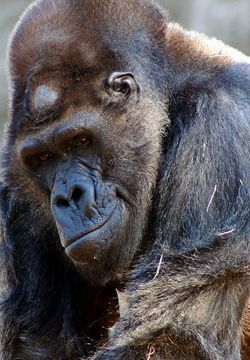 Ivan died on August 20, 2012. He didn't live to see the story he inspired win the Newbery.
Ivan died on August 20, 2012. He didn't live to see the story he inspired win the Newbery.
I'm sure he was quite a reader. [Laughter.] I went to Ivan's memorial service. I'd never been to a gorilla funeral. There were people who came from all over the world, people from Tacoma, people from Atlanta who'd visited him every week, the primatologist who got him moved, Charles Horton. But it took a real group effort to get him moved. He was quite a quirky gorilla, apparently. To see people gather over a western lowland gorilla was very moving. There's stuff I learned at that service I wished I'd known when I was writing the book.
Ivan may not have been a reader, but he was a painter, wasn't he?
The real Ivan had enjoyed finger-painting. I never got to see Ivan. When I tried to visit him in Atlanta, it was raining, and he's not a fan of the rain. But it was so personal to see his fingerpaints. Some of Ivan's paintings have been auctioned.
Was writing Home of the Brave (Feiwel & Friends)--your first stand-alone novel--different from your experience working on a series like Animorphs, or for imprints with clear guidelines, such as Harlequin or Disney?
Home of the Brave was a moment when I tried to switch gears. I love series because I love how voracious readers embrace those books. But Jean Feiwel was kind enough to give me a chance at my first hardcover stand-alone novel. The story arc with a series is a different pace than a free-standing middle-grade. I love middle grade, especially because the brevity appeals to me. It helps me control the plot. Plotting is hard for me. I like word choice, and I like rewriting. I'm more on the chamber music end of things than the symphony end of things.
How does it work when you write with your husband, Michael Grant--with Animorphs or your most recent novel, Eve & Adam? Does he do the plotting and you work on word choice?
It's much messier than that. It's like sausage and legislation, you don't want to see how it's made. [In Eve & Adam,] we were sure I'd take the female voice, and he'd take the male voice. We ended up writing over each other and under each other. It was fun because we were much more experienced [than when we worked on Animorphs] and there was much less ego involved. We wanted to do a rom-com, frothy sort of book. There was no marital counseling needed at all.
What advice would you give to writers?
The truth is, you have to have fun with it. It is fun. You have to do it because you love it, and if you love it, the rest will come. I think people forget that. They get tied up in questions of "Will I be published?," and at the end of the day, it's just about words on paper. And that's the part we all love--most of the time. --Jennifer M. Brown
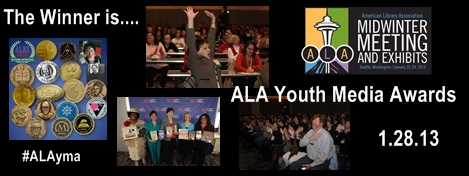 Yesterday the American Library Association announced awards for the top children's and YA books, videos and audios at its Midwinter Meeting in Seattle, Wash.
Yesterday the American Library Association announced awards for the top children's and YA books, videos and audios at its Midwinter Meeting in Seattle, Wash.





SHELFAWARENESS.1222.S1.BESTADSWEBINAR.gif)


 Yesterday in Seattle, about 35 miles north of where "the real Ivan" spent 27 years at a Tacoma, Wash., strip mall, Katherine Applegate won the 2013 Newbery Medal for The One and Only Ivan (HarperCollins). Our
Yesterday in Seattle, about 35 miles north of where "the real Ivan" spent 27 years at a Tacoma, Wash., strip mall, Katherine Applegate won the 2013 Newbery Medal for The One and Only Ivan (HarperCollins). Our  Did growing up in Michigan engender your love of animals?
Did growing up in Michigan engender your love of animals?  Ivan died on August 20, 2012. He didn't live to see the story he inspired win the Newbery.
Ivan died on August 20, 2012. He didn't live to see the story he inspired win the Newbery.
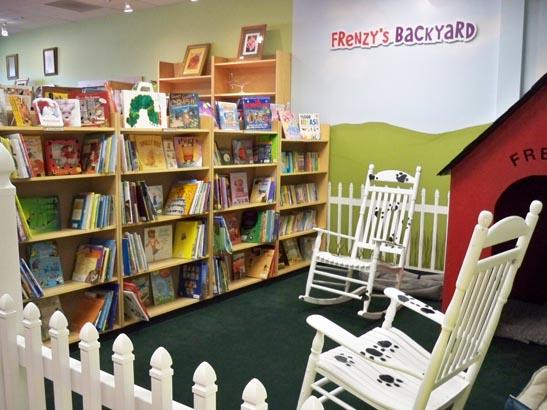 Congratulations! In early April,
Congratulations! In early April, 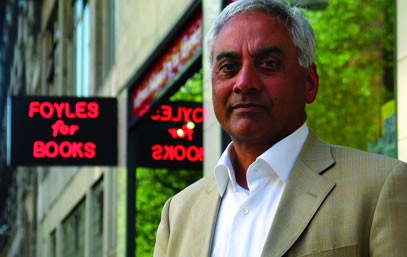
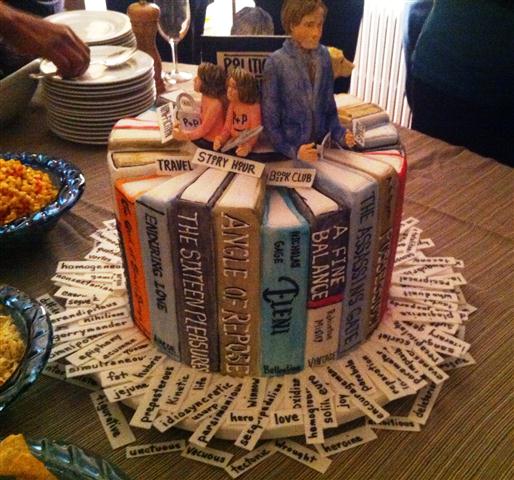
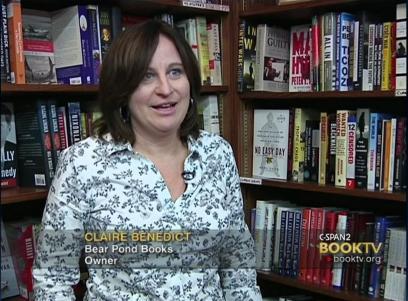 "This is a community that understands that if you're going to have a store in your downtown, you have to go to the store in your downtown. You can't just say that you value it and then buy online," Claire Benedict of Bear Pond Books told her. "We're nice to you when you come in. We chat with you. We spend a lot of time researching, finding, tracking down and ordering books for you if we don't already have what you're looking for. It's personalized service."
"This is a community that understands that if you're going to have a store in your downtown, you have to go to the store in your downtown. You can't just say that you value it and then buy online," Claire Benedict of Bear Pond Books told her. "We're nice to you when you come in. We chat with you. We spend a lot of time researching, finding, tracking down and ordering books for you if we don't already have what you're looking for. It's personalized service."
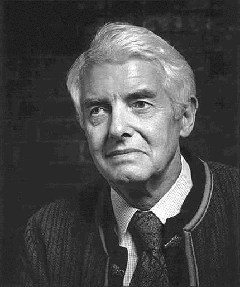 "If John Muir was the most important conservationist in the first half of the twentieth century, David Brower was certainly the most important in the second half of the century," said Robert Baron, founder and chairman of Fulcrum.
"If John Muir was the most important conservationist in the first half of the twentieth century, David Brower was certainly the most important in the second half of the century," said Robert Baron, founder and chairman of Fulcrum.  Revenge: Eleven Dark Tales
Revenge: Eleven Dark Tales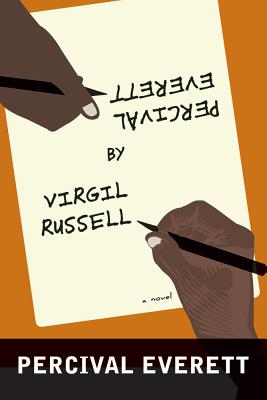 "There are no realities that are more real than others, only more privileged." Percival Everett writes this early in Percival Everett by Virgil Russell, but it's not quite clear whether Percival Everett says this, for the novel's ground is constantly shifting. Just when we've gotten used to one first-person voice, another comes into focus. Is this the story of an aging writer as dictated to his inquisitive son, or is the son imagining what his father might say to him, or is the son even real?
"There are no realities that are more real than others, only more privileged." Percival Everett writes this early in Percival Everett by Virgil Russell, but it's not quite clear whether Percival Everett says this, for the novel's ground is constantly shifting. Just when we've gotten used to one first-person voice, another comes into focus. Is this the story of an aging writer as dictated to his inquisitive son, or is the son imagining what his father might say to him, or is the son even real?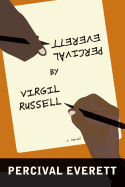
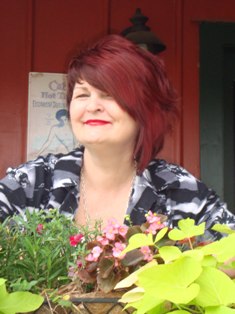 The weekend before last, I attended my fourth Girlfriend Weekend, and next summer my fifth novel will be published. In these past few years, Kathy has become my dear friend and the Pulpwood Queens a significant part of my life. I've come to know the Pulpwood Queens not only as a fun-loving book club with a deep love of glamour (and gemstones! and Marilyn!), but also as an umbrella for all kinds of impassioned offshoot literacy projects that use books to make people's lives richer. Kathy herself uses proceeds from the annual authors' auction at Girlfriend Weekend to fund the Dolly Parton Imagination Library in her home Marion County (Jefferson is the county seat), where 39% of adults are illiterate. Now, through the program, more than 100 children get books every month so that they'll be reading-ready by the time they hit school.
The weekend before last, I attended my fourth Girlfriend Weekend, and next summer my fifth novel will be published. In these past few years, Kathy has become my dear friend and the Pulpwood Queens a significant part of my life. I've come to know the Pulpwood Queens not only as a fun-loving book club with a deep love of glamour (and gemstones! and Marilyn!), but also as an umbrella for all kinds of impassioned offshoot literacy projects that use books to make people's lives richer. Kathy herself uses proceeds from the annual authors' auction at Girlfriend Weekend to fund the Dolly Parton Imagination Library in her home Marion County (Jefferson is the county seat), where 39% of adults are illiterate. Now, through the program, more than 100 children get books every month so that they'll be reading-ready by the time they hit school.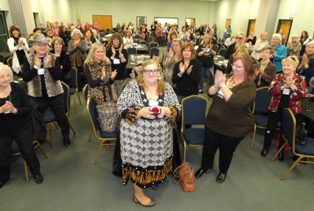 This year's KAT winner is Alyse Urice, an "old hippie rebel" Pulpwood Queen from Golden, Colo., whose tiny nonprofit,
This year's KAT winner is Alyse Urice, an "old hippie rebel" Pulpwood Queen from Golden, Colo., whose tiny nonprofit, 